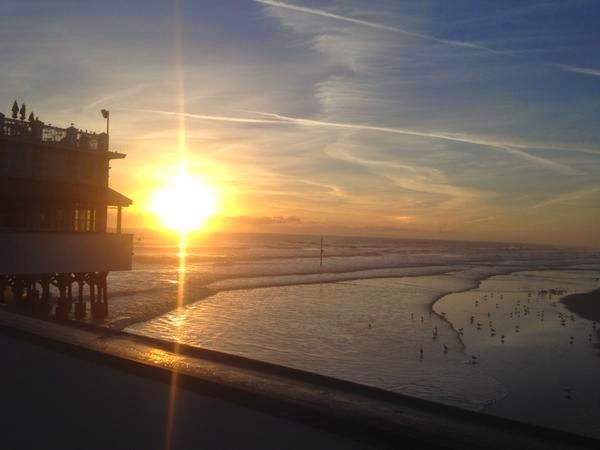I'm writing from the Coastal Magic Convention, right on lovely Daytona Beach. I've been doing sunrise beach walks each morning with fab book blogger Jen from That's What I'm Talking About. Wonderful way to start the conference day!
This week's topic, following on last week's ruminations on negative traits in our heroes and heroines, is how the development of positive traits builds better villains.
I confess I rarely, if ever, think in terms of villains. The word calls to mind the old-style melodramas, in which the villain is identifiable by a glossy handlebar mustache and an evil cackle. Just not my schtick. Because, you all should know by now, I'm a shades of gray kind of gal. I don't even really believe in the concept of evil. I think people do the things they do not acting out some struggle between good and evil, but because they're doing what they want and need to do. Everybody has reasons for their choices. Maybe not admirable or understandable ones, but reasons nevertheless.
Which is the key to writing a better villain.
Give them REASONS.
Villains are, after all, characters in your story also. They should be as fully fleshed as any other character, with goals and conflicts. This is probably why I shy away from the word "villain" - because that implies a single motivation, which is to be evil. Instead, the antagonist should have a noble dream or goal of their own. This is where positive traits come in.
Anyone who vigorously pursues their passion is fascinating to us. We love the story of the underdog who triumphs, the drive to succeed and secure personal victories. Whatever the villain of a given story is striving for, that motivation will be interesting. Even better if he or she sincerely believes that what they want is Good and Right and Necessary.
For example, in my Twelve Kingdoms books, High King Uorsin absolutely - even megalomaniacally - believes in the union of the warring kingdoms. He's a warrior, powerfully determined, nearly a force of nature. It's easy for the reader to see just how wrong and awful he is, but HE doesn't know it. He'd be an admirable person, if he weren't quite so narcissistic.
But hey - we all have our flaws.
Sunday, February 8, 2015
How to Build a Better Villain
 Jeffe Kennedy is a multi-award-winning and best-selling author of romantic fantasy. She is the current President of the Science Fiction and Fantasy Writers of America (SFWA) and is a member of Novelists, Inc. (NINC). She is best known for her RITA® Award-winning novel, The Pages of the Mind, the recent trilogy, The Forgotten Empires, and the wildly popular, Dark Wizard. Jeffe lives in Santa Fe, New Mexico. She is represented by Sarah Younger of Nancy Yost Literary Agency.
Jeffe Kennedy is a multi-award-winning and best-selling author of romantic fantasy. She is the current President of the Science Fiction and Fantasy Writers of America (SFWA) and is a member of Novelists, Inc. (NINC). She is best known for her RITA® Award-winning novel, The Pages of the Mind, the recent trilogy, The Forgotten Empires, and the wildly popular, Dark Wizard. Jeffe lives in Santa Fe, New Mexico. She is represented by Sarah Younger of Nancy Yost Literary Agency.

